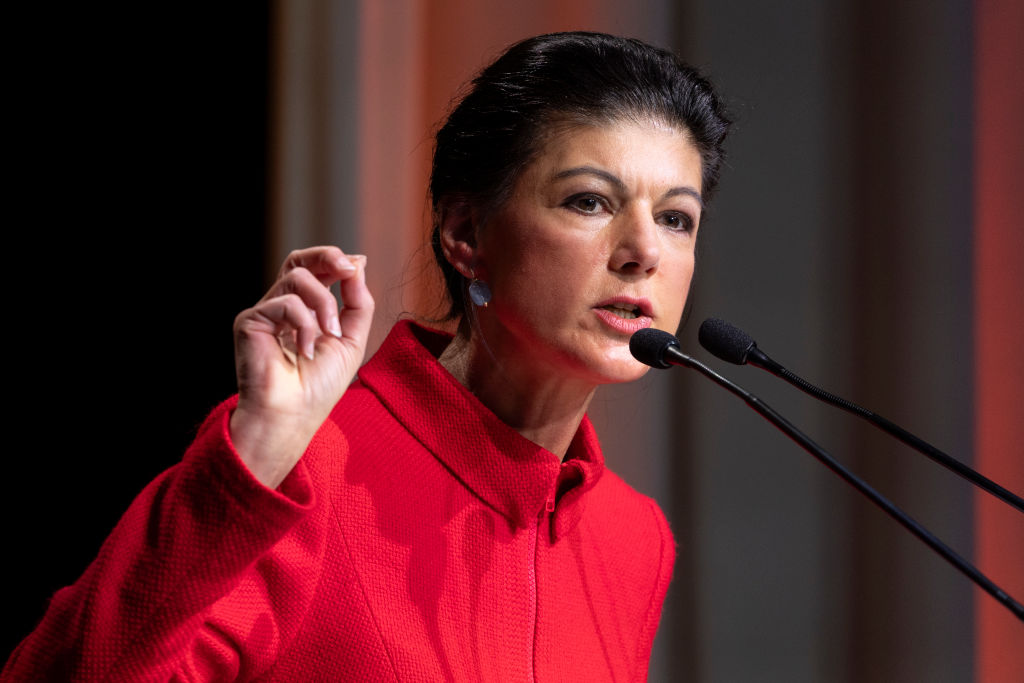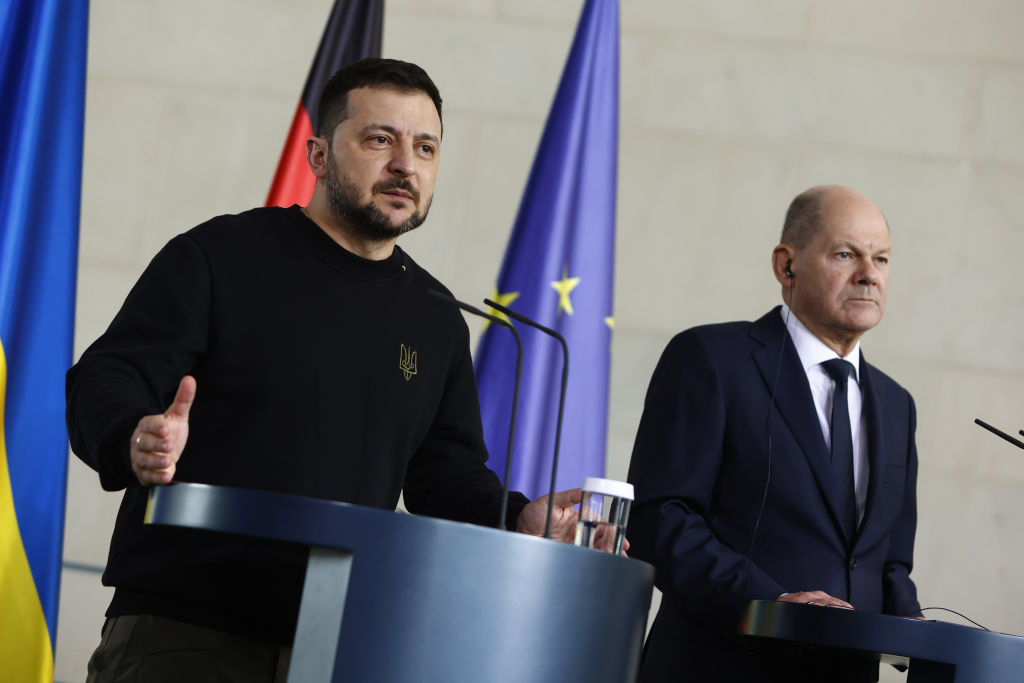Despite Chancellor Olaf Scholz’s widely acclaimed Zeitenwende speech in the immediate aftermath of the Russian invasion, Germany remains stuck in its pre-war strategic stasis for both institutional and philosophical reasons.
Call it “Hobbiton,” the pleasant valley where peaceful Hobbits could pad about amiably between quaffs of mead. Who wouldn’t wish to remain there, if you could? For thirty long years after the collapse of the Soviet Union, Germany could and did.
Economically drunk on cheap Russian mineral imports, blessed with an undervalued Euro, top vendor of complex manufactures to the soaring Chinese economy, and confident that the US would ensure its security, Germany could spend its diplomatic energies weaving a web of diplomatic and economic ties across Europe that would make war irrational if not completely unthinkable. The German military which in the 1980s was a formidable deterrent force was left to rot slowly away.
Perhaps the most mortifying display of the Hobbiton ethos was German Foreign Minister Heiko Maas at the UN openly guffawing at President Trump’s assertion that the Nordstream pipelines made Germany vulnerable to Russian coercion. Well, who is laughing now Heiko? Certainly not German companies, who are paying a steep price in competitiveness and profitability for their loss of Russian energy. BASF can’t squeeze profits out of its massive Ludwigshafen chemical complex and now plans to build its next plant in China, which has guaranteed cheap energy from its growing fleet of coal fired power plants.
Hobbiton imbued the broader European Union with its happy narrative of peaceful prosperity, and much of the EU clings desperately to the vision. Two full years after Vladimir Putin launched the biggest land war in Europe since 1945, the EU has yet to respond in a strategically effective way. Its biggest successes have been financial and administrative: providing the money the government in Kyiv needs to keep functioning, and putting Ukraine on a fast track to eventual membership in the European Union. Both are worthy accomplishments, yet neither has transformed Europe into a strategic actor capable of defending Ukraine or even itself without the help of the increasingly reluctant American superpower across the water.
One may well ask of Europe, where are the factories humming with massive orders for artillery shells and other vital munitions? Where is the surge in joint procurement of tanks and combat aircraft, for both Ukraine and Europe? Where are the large-scale military deployments needed to deter Russia from forays into Eastern Europe or the Baltics? Europe has had two years to assume the role of Ukraine’s primary protector, and it has fallen short. Does anyone doubt that the debate raging in the US Congress over aid to Kyiv would be far less acrimonious if Europe had risen to the occasion in militarily tangible ways?
The recent sting of Donald Trump’s hyperbolic threat to set Russia on any NATO member failing to meet its monetary obligations has created yet another diplomatic kerfuffle, but as usual the European responses more resemble Greta Thunberg’s “How dare you!” than any tangible plans to backfill American contributions to Europe’s defense.
Many of the explanations for these shortcomings point to a host of complex administrative obstacles: the lack of a common EU military command structure, the commitment to fiscal austerity, the persistent desire of France to pull Europe out from under NATO hegemony. All these factors play a role, but none are sufficient to explain the sad state of affairs.
To untangle Europe’s shortcomings, one must (as always) start with Germany. Long before Putin began his military adventures, Hobbiton made a series of errors derived from an unwarranted extrapolation from its uniquely privileged economic position in the EU. At the height of the Eurocrisis, Germany imposed the bitter pill of austerity on Southern Europe, but without the normal recovery mechanisms attached to a standard IMF plan for overly indebted countries. Stuck in the Eurozone, Greece and Italy could not depreciate their currencies to restore wage competitiveness, raise the price of imports from, say, Germany, and correct their trade deficits. Germany refused to embark on the sort of stimulus spending that might have sucked in cheaper imports from the indebted Eurozone members and helped them repair their finances.
Instead, Hobbiton preached the gospel that what worked for Germany would work equally well for southern Europe: balanced budgets and a ferocious commitment to export earnings. Raising the obvious question: if every country in the EU runs an export surplus with the rest of the EU, well then to whom are they exporting?
Good question! Hobbiton had no answer other than to refuse to boost domestic spending to increase imports from the rest of the EU. Germany had done well off debt-fueled exports to Southern Europe, and had no intention of reversing this lucrative trend.
Germany also set aside its vaunted commitment to “More Europe!” when it came to measures urgently needed to bind the Eurozone together and forestall the next crisis. The Italian doom loop remains a looming horror for Europe and the world. Italian banks are stuffed with Italian government bonds. If Italy goes wobbly again, and her bond prices crash, Italian banks may fail. The Italian government simply does not have enough fiscal capacity to rescue its banks. So where is the EU’s FDIC? Stuck in the slow lane of German reluctance.
While the EU did agree on a joint capacity to inspect EU banks, Germany blocked proposals for an EU-wide deposit insurance program. Italy is on its own should its bonds and banks stagger, and will again crawl to the European Central Bank to protect it from the carnivorous bond markets. It seems that “More Europe!” might be best appended with “…if it doesn’t cost Germany.” Germany also consistently blocked the steps needed to compensate for the wildly sub optimal currency area that is the Eurozone. An EU-wide unemployment scheme would send funds automatically to member states in recession, and an EU-wide pension insurance program would back national pension schemes with the full weight of the €20 trillion EU economy. Neither are possible given German resistance.
In an epic feat of policy hubris, Germany compounded these errors by adopting the infamous debt brake in 2009. This was really nothing more than an act of heroic vanity intended to set an example for the deadbeats of southern Europe. Yet it has now become an insurmountable obstacle to meeting German and EU fiscal needs. In the wake of the decision by the Constitutional court that Chancellor Scholz may not use excess Covid funds for any other purpose, his coalition is faced with a self-imposed fiscal emergency.
Germany cannot fund its military revamp past the initial € 100 billion already approved. Aid for Ukraine is imperiled, and an attempt to free up funds by taking diesel subsidies away from farmers created massive tractor blockades and an eventual climbdown by the governing coalition. Given the commitment of the Free Democrats to the debt brake and the Greens to their economically ruinous Net Zero spending plans, the rickety governing coalition has no real answer to its funding emergency. What may give instead is Germany’s long-standing opposition to Eurobonds. The Next Generation Rescue Fund was the first example of issuance of joint EU debt, or Eurobonds. Germany imposed stern conditions on the Fund, namely that it was a one-shot deal in response to Covid, to be wound down by 2026.
Yet now with Germany’s hands tied fiscally, an extension of the Eurobond facility may be the only way for Germany and the EU to realize their desperately needed spending goals, including open-ended aid for Ukraine. The aggregate national debts of EU member states rests at a non-scary 85 per cent of GDP, leaving room for debt-financed joint spending. If the German government can come around to the view that Eurobonds are actually a convenient off-budget financing mechanism for the many things the debt brake prevents the ruling coalition from accomplishing, traditional opposition to common EU debt might recede.
Eurobonds are the first step out of Hobbiton for Germany, and perhaps the easiest in the sense that support for an “ever-closer European Union” has been baked into the German political consciousness for decades. Common debt also lies squarely within the founding philosophy of the EU, dating back to the first EU Commission President, German law professor Walter Hallstein. This new financing tool also fits easily into the core competency of the EU, using collective spending to maintain the health of the single market and the Eurozone.
The harder route out of Hobbiton for Germany lies in foreign policy and security, which lie outside the core competencies of the EU, and which will require a wrenching philosophical re-orientation in Berlin.
“More Europe” is no solution to security threats when the EU is not equipped with an executive capable of using military force in defense of the bloc’s interests. Responsibility for security policy still resides with EU member states, and will remain subject to member state vetoes imposed by malign actors by the likes of Viktor Orban and Robert Fico.
Likewise, Germany’s long sojourn in Hobbiton has allowed it to abjure the normal prerogative of a nation to take unilateral action in its own defense. Post-Cold War Germany embraced liberal institutionalism while eschewing the tawdry trappings of military deterrence or Realist coercion. Hobbiton again extrapolated general policies from its unusual circumstances and promulgated a world in which the dazzling attractions of liberal democracy and material prosperity would prove irresistible to recent authoritarians.
Germany devoted great effort to enmeshing former adversaries in a web of treaties and institutions that would make conflict unthinkable by raising the rewards of cooperation. The Treaty on Conventional Forces in Europe, the Organization for Security and Cooperation in Europe, the Budapest Memorandum, and the 2+4 Agreement on the re-unification of Germany were all elements critical to this task.
Yet with the exception of 2+4, each of these institutions is either dead or moribund. The attractions of Hobbiton proved unpersuasive to states that found ferocious nationalism, militarism, and a well-developed victim complex more politically useful. Hobbiton unwittingly induced this precise response in Russia.
After close inspection of the new European institutions hailed by Germany during the 1990’s, Russia realized her interests would rank somewhere below those of a mid-tier EU state. This was simply unacceptable to a Great Russia nationalist like Vladimir Putin, who quickly learned that an aggressive and potentially threatening Russia gained greater respect from Germany and the West than did the benign oil exporter of Europe’s dreams.
Berlin’s promise of peaceful coexistence looked duplicitous to the Kremlin when NATO rolled right up to Russia’s western borders. Germany’s inability to see that Hobbiton was no model, but rather a highly contingent and temporary respite from great power politics rendered Berlin incapable of comprehending the more primal needs of a weakened state beset by internal divisions, hostile neighbors, and a yearning to return to its rightful status as a great power.
What must Germany do now to escape Hobbiton for good?
Part of the answer requires a dramatic change in Germany’s strategic culture. Scholz’s Zeitenwende is a decent first step, but his lofty pronouncements haven’t yet displaced the reflexive penchant for pacifism and anti-militarism embedded in the German foreign policy establishment.
Germany will never act unilaterally, but it has failed to use its multilateral ties to make a stronger military posture acceptable to a wary public. Protecting Europe will always be more popular domestically than defending Germany; Berlin should present a new, more assertive deterrent in those terms. NATO can do today what the EU will never be able to do, and Germany needs to apply her industrial capacity to rebalancing alliance contributions. Germany should also be the natural bridge between the EU and NATO: the emissary of Europe to Washington, the emissary of the Atlantic Alliance to Brussels. It can fulfill this role if it can get some serious financial skin in the game of arming Ukraine. Assuming the leading role America has taken in providing hardware to Ukraine would give Germany immediate credibility in Washington.
Ramping up military production is a matter of money and will. Using Eurobond revenues to boost military production will give all of Europe a stake in common defense, and defuse much of the criticism of “free-loading Europe” in the US.
It can be done: Germany recently constructed a major LNG facility in a matter of months rather than the normal years through the expeditious waiver of environmental and business regulations. There is no reason Germany cannot also build munitions and weapons factories quickly at a scale needed to defend Ukraine and rearm Europe. The new ammo plant touted by Germany will produce 100,000 shells a year, but ten times this output is needed. It is past time for Germany to rebuild its defense manufacturing base. It can do this if it also mobilizes the EU’s latent fiscal capacities.
Cooperation with France is critical. Right now Paris and Berlin are squabbling over joint plans to design and build the next generation of fighter aircraft and armored vehicles. If Scholz and Macron can overcome their personal antipathy, a reasonable compromise benefitting each nation’s defense contractors could serve as a long term template for joint arms production. France in turn will need to abandon its vain hope of transforming the EU into a French-led security organization.
The Eastern European members of the EU will never trust French security guarantees, and the French will never place their military and nuclear weapons under the command of a non-French EU general officer. NATO remains the security provider for Europe, but it can only thrive if the Europeans led by Germany commit enough money, manpower and weapons to it.
Life in Hobbiton was a lovely respite after the horrors of the twentieth century and the grinding politics of the Cold War. But the happy years of peaceful prosperity are now over for Germany. Berlin must rejoin a world where security is earned through national sacrifice, and alliances are durable only when those sacrifices are shared equally.





A tale of two energy revolutions: How Germany got it astonishingly wrong and the United States got it astoundingly right. Now the whole of Europe needs to choose